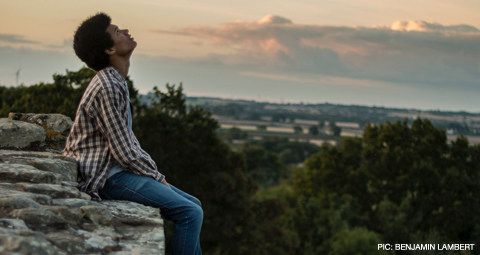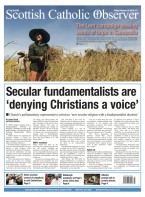January 26 | ![]() 0 COMMENTS
0 COMMENTS ![]() print
print

Keep your head up when challenges arise
This week, THE BOW IN THE HEAVENS looks at the difficult times ahead of Scotland’s dioceses— By FR JOHN BOLLAN
If the thought of priests having massages makes you queasy, then read no further. I’ve only had two in my life, the most recent during my brief sunshine break in Fuerteventura. The main reason I besought the ministrations of the masseur was that tension I mentioned in last week’s column. In many ways, I feel that I’ve been ‘humphing’ it around with me—as indeed I tend to do—in my lower neck and across my shoulders.
The massage itself was quite an instructive experience. As well as spending a lot of time working out the stiff knots in my shoulders, the masseur, my new best friend Leo, announced that I have a slight scoliosis, or curvature of the spine. On the one hand this was news to me, as no one has, for obvious reasons, paid all that much attention to my back up until now. On the other hand, it came as no great surprise as my wee mum had, towards the end of her life, quite a pronounced scoliosis. It was, in fact, the reason she ended up a ‘wee mum’ instead of the statuesque lady she had been in her younger days. So a bit of me wasn’t too surprised to learn that I had inherited that particular trait from my mother.
Although I didn’t mention this unfortunate bit of heredity, she did make an appearance of sorts in the sparse moments of interaction with Leo. Out of the blue, he asked: “Do you mind me asking, is your mum still alive?”
“No,” I replied.
“But it was very recent, no?”
“Not really,” I replied, “it was nearly six years ago now.”
There was a sharp Hispanic intake of breath. “Ay! It feels very new!” When I pressed him about what he meant, he answered that he considered one of these unresolved knots had been the shock of the loss of my mum and that, without realising it, this grief had been etched into my flesh, or what passes for muscles, like some emotional sprain.
Naturally, I am somewhat sceptical about any suggestion that massage practitioners may be endowed with second sight or clairvoyant powers, but I do feel he put a finger, both literally and metaphorically, on a neuralgic spot.
Despite the years which have elapsed with surprising speed, my mum’s death does all feel very fresh to me and, I know, to my family.
I wonder if unresolved grief can, given the deep connection between body and soul, distort not just our frame of mind but our physical frame too?
I hope it doesn’t sound too naive to say that, in the aftermath of the massage, I felt more at peace—and clearer headed—than I have done for some considerable time. I’m also more aware of my posture, so I’ll be paying more attention to my spine in future!
I’m very grateful to my bishop for providing a pastoral letter to be read during the weekend I returned from my holiday. This got me off preaching duties while I recovered from the (nearly) five-hour flight and 75-minute delay.
Normally, I make copies of episcopal letters available to the people in hard copy and draw out the main points, but this was one which really needed to be read as it may come to be regarded as one of the most significant letters in our history as a diocese. Its theme was the synodal journey we shall be taking in 2018, praying and discussing how to move from being ‘a church of maintenance’ to ‘a church of mission.’
Part of this journey necessarily involves considering the current shape of our diocese, the location of our parishes and whether they reflect the demographic shifts of the past 30 years or so.
I have no doubt this will be a challenging process for many, myself included. The Gospel last Sunday recounted the call of the first apostles: the call to follow inevitably entails a leaving, or a letting go, of familiar places and routines. That may well prove to be something of a roadmap for many of the faithful of this diocese, as it has been in other places.
We are on the threshold of Catholic Education Week and, as attentive readers will be aware, this year’s celebrations are focused on the centenary of the 1918 Education (Scotland) Act which essentially established the provision we enjoy to this day. The theme, both locally and nationally, is that Catholic schools are good for Scotland. Here in Inverclyde, we are fortunate to have well-equipped and oversubscribed schools.
Even in my schooldays, when the buildings and facilities were more ‘the state of that’ than ‘state of the art,’ we enjoyed an excellent education which was unabashed in its optimism and aspiration. It’s only right that we celebrate those things.
I gather there’s been some controversy over the invitation extended to the First Minister to give the Cardinal Winning Lecture at Glasgow University in March. This lecture, originally held in St Andrew’s College in Bearsden and subsequently renamed in honour of the late archbishop after the merger with the university, used to be held during (or near) Catholic Education Week itself.
Many of the objections to the First Minister’s presence are centred around some of the policies she espouses which are at variance with Catholic teaching.
As has been pointed out, however, this is an event hosted by the university who can invite whoever they wish to be the Winning lecturer—not least a Glasgow graduate who occupies the highest office in the land.
Just as Bishop Keenan (another Glasgow graduate) has warned against the pernicious implications of ‘no platforming’—speakers who may offend secular sensibilities—we must be gracious in giving a respectful hearing to those with whom we may passionately disagree on a whole range of issues.
Both the Church and the society which Cardinal Winning ‘bestrode like a colossus’ 20 years ago have undergone rapid and, in many ways, uncomfortable changes. The fact that Catholic schools still punch above their weight and that the First Minister will, I’m sure, publicly reiterate that, is a welcome addition to these centenary celebrations.
One of the risks which the Church in Scotland runs—especially in these days of, let’s face it, diminished status—is the echo chamber effect.
This happens when we become increasingly inward-looking and simply confirm each other in our beliefs but also our prejudice (and this can take many forms).
Of course, society itself is no less susceptible to this temptation, although Hans Christian Anderson best captured the same phenomenon in The Emperor’s New Clothes.
One of the great services both Church and society can render each other is an occasional ‘reality check.’
This can only be good for both parties. While our status may be diminished, there’s nothing to say our stature needs to be compromised: we can still hold our heads high, backs straight. Ecclesial scoliosis is by no means inevitable.
This is the first Observer ‘copy’ I’m filing since the departure of editor Ian Dunn. It was Ian who, with his judgement perhaps befuddled by fortified tonic wine, first approached me to create this column.
While I have done him a huge favour in contributing twice his suggested word count for the same fee, taking care of the entire back page in the process, I also owe him a debt of gratitude as well.
In a way, he also offered me a way out of the echo chamber of my own head, by opening up a conversation with the readers of the Scottish Catholic Observer. Most of it, like everything else in my head, is nonsense, but I’m glad that the odd bit of sense has occasionally found the exit to resonate in the mind and heart of my faithful reader.
He has swapped the SCO for SCIAF and, just as the lengthening of a name often betokened a blessing in the Old Testament, so I hope his new posting will bring him many blessings. Onwards and upwards!











